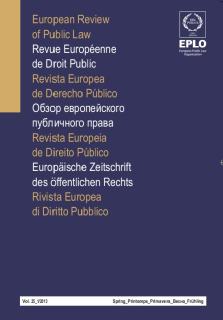
Public Law and the Economic Crisis
An Approach
under the Human Rights Perspective
Albania
Migena Leskoviku
Prof. Assoc. Dr., Law Faculty, European University of Tirana, Albania
Dorian Leskoviku
Phd candidate in International Relations, Faculty of History, University of Tirana, Albania
The economic and financial crisis is a global crisis that requires global solutions. The rapid escalation of the financial crisis into a global economic crisis also demonstrated that the liberalization of trade and markets has brought an unprecedented degree of integration and interdependence amongst economies and countries, affecting the poorest and the vulnerable groups in a society. Decision-making on economic policies and responses to the crisis at the global level should also meet the human rights standards and principles, especially of non-discrimination, participation, transparency and accountability. A human rights-based policy response does take as its start a clear and universally recognized set of standards founded on the core instruments of international human rights law - to guide the design and implementation of economic policies and programs to address the crisis. Human rights do not only set limits to oppression and authoritarianism; they also impose positive obligations on States to uphold economic, social and cultural rights. States have the duty to respect, protect and fulfill human rights at all times, especially in times of crisis. The primary responsibility for meeting human rights lies with national governments. But, at the same time, governments also bear a legal obligation of international cooperation and assistance in the realization of fundamental human rights and freedoms. In addition to positive responsibilities to assist other States in the fulfillment of these rights, especially from an EU perspective, governments have the duty to respect and protect fundamental rights and freedoms from a supranational perspective.
La crise économique et financière est une crise mondiale qui requiert des solutions globales. L'évolution rapide de la crise financière en crise économique mondiale a aussi montré que la libéralisation du commerce et des marchés avait apporté un degré jamais atteint d'intégration et d'interdépendance entre les économies et les pays, affectant les groupes les plus pauvres et vulnérables de la société. La prise de décisions en matière de politiques économiques et les réponses à la crise au niveau mondial doivent aussi satisfaire aux standards et principes des droits de l'homme, spécialement ceux de non-discrimination, participation, transparence et responsabilité. Une réponse fondée sur une politique des droits de l'homme a son point de départ dans un ensemble clair et universellement reconnu de standards fondés sur les instruments fondamentaux du droit international relatif aux droits de l'homme, afin de guider la conception et la mise en œuvre des politiques économiques et des programmes de lutte contre la crise. Les droits de l'homme ne posent pas seulement des limites à l'oppression et à l'autoritarisme: ils imposent aussi des obligations positives aux Etats de défendre les droits économiques, sociaux et culturels. Les Etats ont l'obligation de respecter, protéger et réaliser les droits de l'homme à tout moment, et spécialement en temps de crise. La responsabilité première de respecter les droits de l'homme incombe aux gouvernements nationaux. Mais dans le même temps, les gouvernements ont aussi une obligation légale de coopération et d'assistance internationale dans la réalisation des droits et libertés fondamentaux. A côté de leurs responsabilités positives d'aider d'autres Etats à mettre en œuvre ces droits, spécialement dans la perspective de l'Union européenne, les gouvernements ont l'obligation de respecter et protéger les droits et libertés fondamentaux dans une perspective supranationale.





















